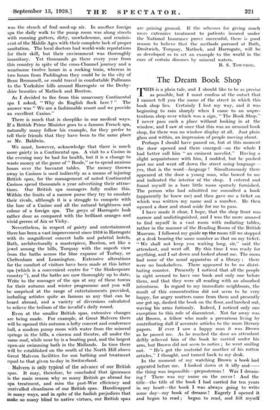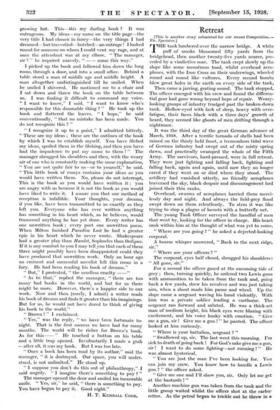The Dream Book Shop
THIS is a plain tale, and I should like to be as precise as possible, but I must confess at the outset that I cannot tell you the name of the street in which this book shop lies. Certainly I lost my way, and it was beginning tb rain sharply when I came to an unpre- tentious shop over which was a sign, " The Book Shop." I never pass such a place without looking in at the window, and I saw at once that this was an unusual book shop, for there was no window display at all. Just plain glass and within, an impression of people moving about.
Perhaps I should have passed on, but at this moment the door opened and there emerged—on the whole I had better call him " an eminent novelist." Having a slight acquaintance with him, I nodded, but he pushed past me and went off down the street using language— yes, that is the word—language ! Simultaneously there appeared at the door a young man, who bowed to me and indicated the interior of the shop. I entered and, found myself in a bare little room sparsely furnished. The person who had admitted me consulted a book (apparently he knew me) and then gave me a ticket on which was written my name and a number. He then opened a door and stood aside for me to pass.
I have made it clear, I hope, that the shop front was narrow and undistinguished, and I was the more amazed to find myself in a vast room with radiating tables, rather in the manner of the Reading Room of the British Museum. I followed my guide up the room till we stopped at a desk bearing the same number as that on my ticket. " We shall not keep you waiting long, sir," said the attendant, and went off. By this time I was ready for anything, and I sat down and looked about me. The room had none of the usual apparatus of a library ; there were no bookshelves. There appeared to be no distri- buting counter. Presently I noticed that all the people in sight seemed to have one book and only one before them, and that they were all reading with an absorbed intentness. In regard to my immediate neighbours, the result of this concentration did not seem to be very happy, for angry mutters came from them and presently one got up, dashed the book on the floor, and lurched out, waving his arms furiously. Indeed, I noticed only one exception to this rule of discontent. Not far away was old Brown, a fellow who made a precarious living by contributing dull if accurate articles to the more literary papers. If ever I saw a happy man it was Brown as he passed me. As he reached the door an attendant deftly relieved him of the book he carried under his arm, but Brown did not seem to notice ; he went smiling out. " He's got the material for another of his rotten articles," I thought, and turned back to my desk.
In the moment of my watching Brown a book had appeared before me. I looked down at it idly and the thing was impossible—preposterous ! Was I dream- ing ? There was my name on the cover ! And the title—the title of the book I had carried for ten years in. my heart—the book I was always going to write some day-my book of dreams ! Eagerly I opened it and began to read ; began to read, and felt myself growing hot. This—this my darling book ? It was outrageous. My ideas—my name on the title page—the Very title I had chosen in fancy—the very things I had dreamed—but travestied—botched—an outrage ! I looked round for someone on whom I could vent my rage, and at once the attendant was at my elbow. " The manager, sir ? " he inquired suavely. " come this way."
I picked up the book and followed him down the long room, through a door, and into a small office. Behind a table stood a man of middle age and middle height. A man altogether undistinguished till he smiled. When he smiled I shivered. He motioned me to a chair and I sat down and threw the book on the table between us. I was finding it difficult to command my voice. " I want to know," I said, " I want to know who's responsible for this damnable thing ? " He took up the book and fluttered the leaves. " I hope," he said conventionally, " that no mistake has been made. You do not recognize this ? "
" I recognize it up to a point," I admitted bitterly. " These are my ideas ; these are the outlines of the book by which I was to establish myself. You have filched my ideas, spoiled them in the filching, and then you have had the impudence to put my name to them ! " The manager shrugged his shoulders and then, with the weary air of one who is constantly making the same explanation, " You are not quite fair to us—or to yourself," he said. " This little book of essays contains your ideas as you would have written them. No, please .do not interrupt. This is the book as you would have written it ; you are angry with us because it is not the book as you would have liked to write it. I assure you that our method of reception is infallible. Your thoughts, your dreams, if you like, have been transmitted to us exactly as they left you. Everyone who has ever written anything has something in his heart which, as he believes, would transcend anything he has yet done. Every writer has one unwritten book ; every poet one unwritten poem. When Milton finished Paradise Lost he had a greater epic in his heart which he never wrote. Shakespeare had a greater play than Hamlet, Sophocles than Oedipus. If it is any comfort to you I may tell you that each of these three might possibly have been disappointed could they have produced that unwritten work. Only an hour ago an eminent and successful novelist left this room in a fury. He had been reading his book of dreams."
" But," I protested, " the needless cruelty —" " As to that," replied the manager, " there are too many bad books in the world, and but for us there might be more. However, there's a happier side to our work. Now and then (rarely, I admit) a writer reads his book of dreams and finds it greater than his imaginings. But for us, he would not have dared to think of giving his book to the world."
" Brown ! " I exclaimed.
" Yes," was the reply, " we have been fortunate to- night. That is the first success we have had for many months. The world will be richer for Brown's book.
As for this " He touched a button on his table and a little trap opened. Involuntarily I made a grab —after all, it was my book. But I was too late.
" Once a book has been read by its author," said the manager, " it is destroyed. Our space, you will under- stand, is not unlimited." He stood up.
" I suppose you don't do this out of philanthropy," I said angrily. " I imagine there's som ething to pay ? "
The manager opened the door and smiled his inexorable smile. " Yes, sir," he said, " there is something to pay. You have begun to pay .it. Good night."
H. T. KEMBALL COOK.







































 Previous page
Previous page